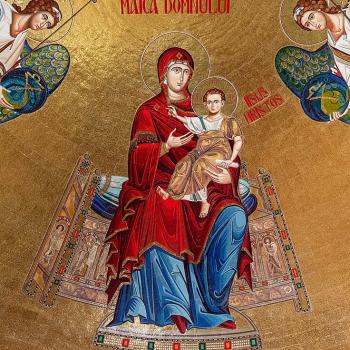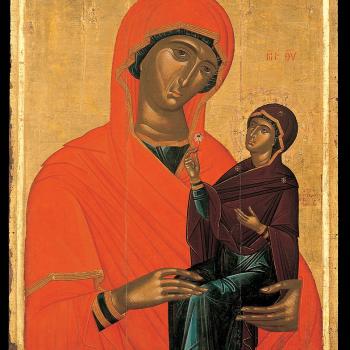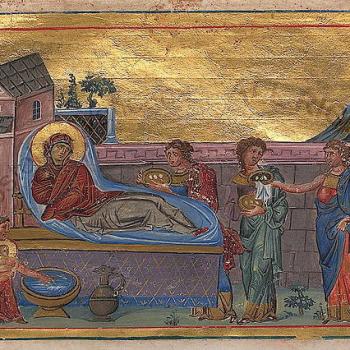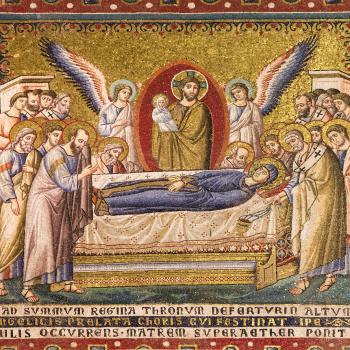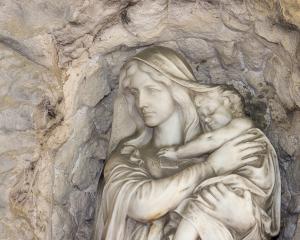
TThe Temple of God held the presence of God within, which is how and why, among its many important features, it can be understood, not only as something important in and of itself, but also foreshadowing (through typology) Mary, the Mother of God, who conceived and carried within her womb Jesus, the Word of God.[1] Likewise, Jesus called his own body a temple (cf. Jn. 2:21), because he was the Spirit-bearer, the Christ.[2] Christians, being incorporated into the body of Christ through baptism, receive the fullness of the Spirit at their confirmation (chrismation), making them, and their bodies, temples of the Holy Spirit (cf. 1 Cor. 6:19). This means, there are analogies which can be made between the Temple of God in Jerusalem, with Mary, and likewise, Mary with her son Jesus, and Jesus with us. Once we recognize those analogies, we can find ways in which the Temple helps us to understand Mary, Jesus and likewise, our own status as a temple of God.
Exploring the various analogies which can be observed, we can be led to see the similarity and relationship between motherhood and being a temple of God. The interior of The Temple was like Mary’s womb, wherein God dwelt without being contained by it. But if we understand this relationship between Mary and the Temple, we should be able to see it is true with all who become temples of God. When we become a temple of the Holy Spirit, we become, as it were, mothers who conceive Christ in our lives.
Motherhood is significant and something to be praised. It is a part of the human condition, indeed, a major part of it. Ignoring it, and its relationship to holiness, undermines humanity, and those who would regulate it as something inferior, ignore that it is through the motherhood of the Virgin Mary that God deigned he would incarnate and bring his deifying grace to the world. We must come to understand, as masculinity and femininity both have qualities in themselves which allow them to imagine God, and motherhood is a characteristic and potential found within femininity, the principle of motherhood comes from God and is found within God. The holiness of the Temple, the holiness of Mary, indeed, the holiness of all Christians who become temples of the Holy Spirit, all point to and come out of the truth of motherhood found in the Godhead. This truth is beautifully explored by Julian of Norwich in her writings as she explored divine motherhood, especially as she saw it connected to the second person of the Trinity, God the Word:
I contemplated the work of all the blessed Trinity, in which contemplation I saw and understood these three properties: the property of the fatherhood, the property of the motherhood, and the property of the lordship in one God. In our almighty Father we have our protection and our bliss, as regards our natural substance, which is ours by our creation from without beginning; and in the second person, in knowledge and wisdom we have our perfection, as regards our sensuality, our restoration, and our salvation, for he is our Mother, brother and saviour; and in our good Lord the Holy Spirit we have our reward and gift for our living labour, endlessly surpassing all that we desire in his marvelous courtesy, out of his great plentiful grace. For all our life consists of three: in the first we have our being, and in the second we have our increasing, and in the third we have our fulfillment. The first is nature, the second is mercy, the third is grace.[3]
Mothers give themselves over to their children, helping them to grow, both in the womb, but also when they are born. Indeed, motherhood is not fulfilled simply by giving birth. When mothers perfect their relationship with their children when they guide and direct them so that they can thrive in the world at large. Many who might have not given birth to children prove themselves to be great mothers because of the care they give to those who have been handed over to their guardianship. God the Word, while designated as the “Son of God” likewise represents this maternal aspect of God by the nature of the incarnation. The Son assumes – takes up – human nature, and bears it within (like within a womb), so that humanity, like a child of the Word, can grow and be nurtured by grace. It is through the incarnation, likewise, we become children of God. The Word of God gives birth to the new children of God, those who are to be welcomed into the heavenly kingdom and receive a divine inheritance. Not only does the Word give birth to our salvation, the Word guides and directs us like a mother, which is why Jesus said, “How often would I have gathered your children together as a hen gathers her brood under her wings, and you would not” (Matt. 23:37 RSV). For Jesus has been working throughout history, in the preparation for the incarnation, in the incarnation itself, and afterward, directing the would-be children of God, trying to gather them in and protect them from the harm of sin, not like an indifferent father who pushes his children away, telling them t make something of themselves, but as a protective mother, who knows they cannot sustain themselves without her loving help.
Julian also noted that God the Word can be seen as acting like a mother, not only by giving birth to us in grace, but by the very act of creation, and so the Word can be shown to be a mother to us in a variety of ways:
Our Mother in nature, our Mother in grace, because he wanted altogether to become our Mother in all things, made the foundation of his work most humbly and most mildly in the maiden’s womb. And he revealed that in the first revelation, when he brought that meek maiden before the eye of my understanding in the simple stature which she had when she conceived; that is to say that our great God, the supreme wisdom of all things, arrayed and prepared himself in this humble place, all ready in our poor flesh, himself to do the service and the office of motherhood in everything. [4]
The incarnation allows the Word to fulfill the maternal instincts of the Godhead found in the Word. The Virgin, Mary, the reflection of the Temple, was prepared by God to fulfill her mission, to become the Mother of God, so that in and through her, God can become human, God can become one of us, and “do the service and the office of motherhood in everything.” The Temple and Mary both show us various maternal aspects found within the Godhead. When Mary was brought to the Temple, what was prefigured in the Temple was fulfilled in her, so that we, contemplating the two, can begin to understand the holiness of motherhood, and with it, its place in the Godhead.
[1] We must not ignore the intrinsic value of the Temple itself in salvation history. We must not look at it as being a mere type which is fulfilled in and with Mary. God truly gave his presence to Israel in and through the Temple. That presence allowed Israel to have a special relationship with him, a relationship which should not be ignored nor denigrated by Christians.
[2] It is true, Jesus is the God-man, so that he is himself God and man, but in his humanity, he also bore the Spirit within so that he could and would share the Spirit with us.
[3] Julian of Norwich, The Showings. Trans. Edmund Colledge, OSA and James Walsh, SJ (New York: Paulist Press, 1978), 293-4[Long text].
[4] Julian of Norwich, The Showings, 297 [Long text].
Stay in touch! Like A Little Bit of Nothing on Facebook.
If you liked what you read, please consider sharing it with your friends and family!




